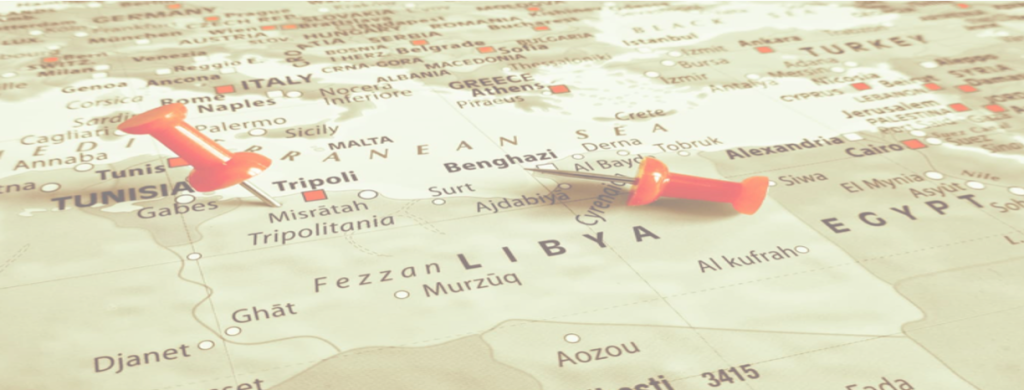
Weekly Highlights
- Morocco’s Bouznika welcome delegation from Libya
- Libya experiences more blackouts as oil ports remain blocked
- NOC condemns military activity in Ras Lanuf port
- Libya’s interior minister restored to post after talks
- UN chief urges Libya to shut migrant detention centers
- Currency Exchange:
- Bank exchange rate: USD 1 – LYD 1.3661
- Black market exchange rate: USD 1 – LYD 6.40
EXECUTIVE SUMMARY
Morocco’s Bouznika welcome delegation from Libya
Dubbed “Libyan Dialogue”, the talks brought together five members of the Tripoli-based Government of National Accord (GNA) and five from the Tobruk-based Parliament. Morocco’s approach to the Libyan conflict is based on universal aims to maintain Libya’s territorial integrity, sovereignty, and the cohesion of the Libyan people. The country believes the solution to the crisis can only come from the Libyan people, and that the crisis must be free of foreign intervention. Morocco argues that foreign involvement will further complicate the already complex situation. Morocco also maintains that the solution in Libya must be peaceful and political to ensure the legitimacy of its future government. LIBYA EXPRESS
Libya experiences more blackouts as oil ports remain blocked
Libya’s central and southern regions experienced a major power outage on Thursday, the state General Electricity Company of Libya (GECOL) said on Friday, while Libya’s oil terminals remain blocked for exports. The most recent blackout comes after a series of power outages in Libya this summer, Libya Herald reports. Last month, Libya’s National Oil Corporation (NOC) said that the closure of oil ports in the Gulf of Sirte was the main reason for the power outages in eastern Libya. “By closing the ports in the Gulf of Sirte, the condensate reservoirs at the export ports will be filled within days, and thus the production of the gas associated with the condensate, which feeds Zueitina power stations and north of Benghazi, will come to a halt,” NOC chairman Mustafa Sanalla said. OIL PRICE
NOC condemns military activity in Ras Lanuf port
Libya’s state National Oil Corporation (NOC) yesterday condemned what it called the ‘‘irresponsible and dangerous military activity’’ in Ras Lanuf port area. It renewed its call for the immediate and unconditional demilitarisation of all oil facilities after it reported that military personnel fired live rounds and heavy weapons in Ras Lanuf port. ‘‘The presence of forces including mercenaries who lack any kind of discipline are a true threat to NOC workers and facilities all over Libya’’, the NOC statement read. The NOC said that theMohamed Bey, a Comoros-registered vessel, was scheduled to enter the commercial section of Ras Lanuf port at 1100 hours on Friday (4 September) to load scrap. LIBYA HERALD
Libya’s interior minister restored to post after talks
Libya’s internationally recognised Government of National Accord (GNA) on Thursday restored the interior minister to his post after announcing his suspension last week following protests over living conditions, reported Reuters. Fathi Bashagha said in a statement posted online that he had been reinstated after a five-hour hearing about the protests and the role of the security forces. An influential figure from the port city and military power base of Misrata, Bashagha is well regarded by the GNA’s foreign backers and played a central role as it repelled a 14-month assault on Tripoli by eastern-based forces. MEMO
UN chief urges Libya to shut migrant detention centers
UN Secretary-General Antonio Guterres renewed his call for Libya’s authorities to close migrant detention centers across the country, describing a raft of human rights abuses inside the facilities. In a report submitted to the Security Council on Thursday, Guterres said more than 2,780 migrants were detained across the war-ravaged country as of July 31. Twenty-two percent of those held are children. Inside the facilities, men and boys are frequently threatened with violence and their families are pressured to send ransom money, according to the report. AL MONITOR
USEFUL INFORMATION
List of holidays in Libya 2020
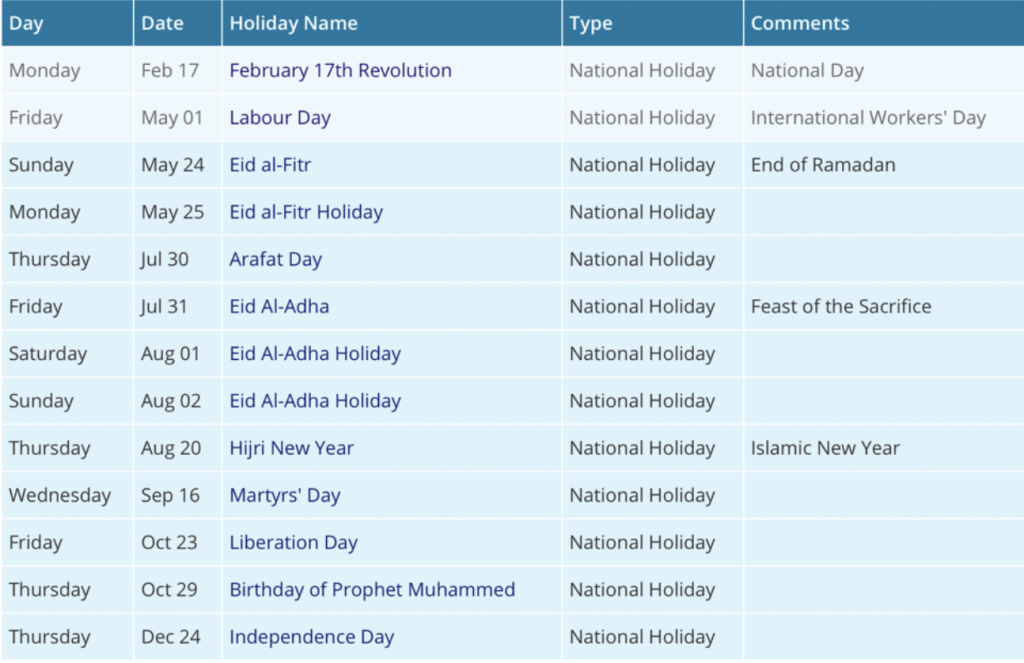
Exchange rates – Libyan Dinar
According to our most recent information (31st August & 05th September 2020) the Libyan Dinar has the following exchange rates.
The exchange rate from your own bank or credit card company will differ somewhat from the exchange rates as mentioned above. Your bank or credit card company might also apply additional international charges.

LIBYA SECURITY & RISK LEVELS

Crime levels in Libya remain high, including the threat of kidnapping for ransom. Westerners and U.S. citizens have been targets of these crimes.
Terrorist groups continue plotting attacks in Libya. Violent extremist activity in Libya remains high, and extremist groups have made threats against U.S. government officials and citizens. Terrorists may attack with little or no warning, targeting tourist locations, hotels, transportation hubs, markets/shopping malls, and government facilities.
Outbreaks of violence between competing armed groups can occur with little warning and have the potential to impact U.S. citizens. The capital, Tripoli, and other cities, such as Surman, Al-Jufra, Misrata, Ajdabiya, Benghazi, Sabha, and Dernah, have witnessed fighting among armed groups, as well as terrorist attacks. Hotels and airports frequented by Westerners have been the targets of these attacks. Even demonstrations intended to be peaceful can turn confrontational and escalate into violence.
For the latest information regarding COVID-19, please visit:
Centers for Disease Control and Prevention’s (CDC)
If you decide to travel to Libya:
- Carry proof of citizenship and valid immigration status at all times.
- Avoid demonstrations and crowds.
- Make contingency plans to leave.
- Establish your own personal security plan in coordination with your employer or host organisation or consider consulting with a professional security organization.
- Develop a communication plan with family and/or your employer or host organization.

LIBYA INCIDENT MAPPING: 01 – 08 SEPTEMBER 20
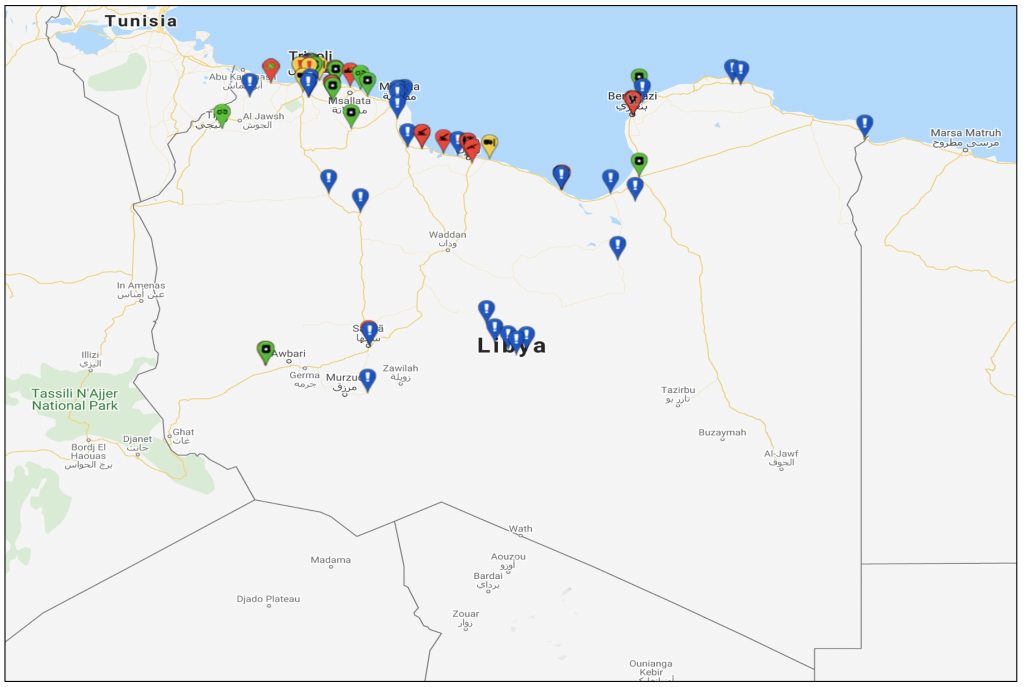
LIBYA – SIGNIFICANT INCIDENTS IN DETAIL
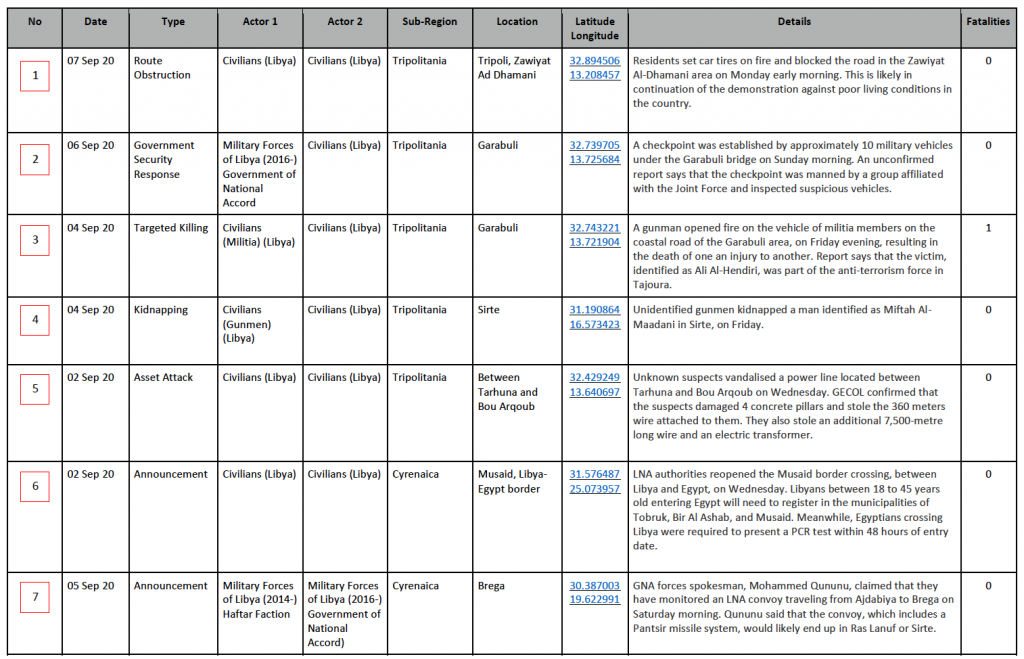
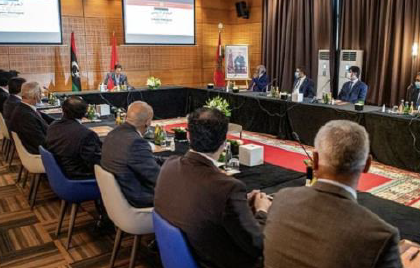
Rival Libyan administrations hold talks in Morocco
Delegates from Libya’s rival administrations met for talks Sunday in Morocco, more than two weeks after the two sides announced a surprise ceasefire. The meeting, held at the initiative of Morocco which hosted peace talks in 2015 that led to the creation of a United Nations-recognised government for Libya, kicked off in the coastal town of Bouznika, south of Rabat.
Dubbed “Libyan Dialogue”, the talks brought together five members of the Tripoli-based Government of National Accord (GNA) and five from a parliament headquartered in the eastern Libyan city of Tobruk. Moroccan Foreign Minister Nasser Bourita, in remarks before the meeting got underway, said his country was offering the Libyans “space” to discuss points of contention dividing them.
“The kingdom is ready to provide Libyans with a space to discuss (issues), according to their will, and will applaud them regardless of the outcome,” Bourita said. “Morocco has no agenda or initiative to submit” to the two sides, Bourita added. A solution to Libya’s crisis must be decided by the Libyans themselves under the auspices of the UN, he said, before delegates met behind closed doors. DAILY MAIL
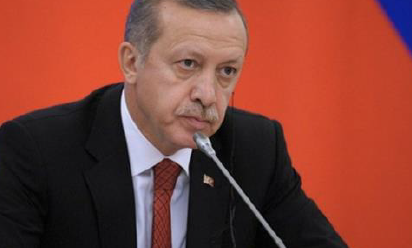
Sanctions can persuade Turkey’s Erdogan to end reckless policies
At the EU summit on Sept. 24-25, European leaders will decide whether or not to impose sanctions on Turkey. Most of them agree on confirming the existence of obnoxious Turkish policies, guided by President Recep Tayyip Erdogan, in Syria and Libya, with Hamas and the Muslim Brotherhood, and not least in the Eastern Mediterranean, which could descend into a war with Greece.
The general impression is that so much aggressive and provocative foreign policy is evidence that Turkey is pursuing expansionist territorial ambitions. Many politicians say there is no need for any further demonstration of Turkey’s interventionist intent. While there is a common agreement found among most of the Europeans regarding Turkey, they do not concur on how to express their stand.
In the US, the Office of Foreign Assets Control last year-imposed sanctions on Turkey, punishing it for its military actions in Syria. However, they were lifted after just four days, when a cease-fire was signed. Afterwards, the US House of Representatives passed the “Protect Against Conflict by Turkey Act,” which could impose sanctions on Turkey if it becomes law. EURASIA
REGIONAL REPORTED INCIDENT NUMBERS: 01 – 08 SEPTEMBER 20
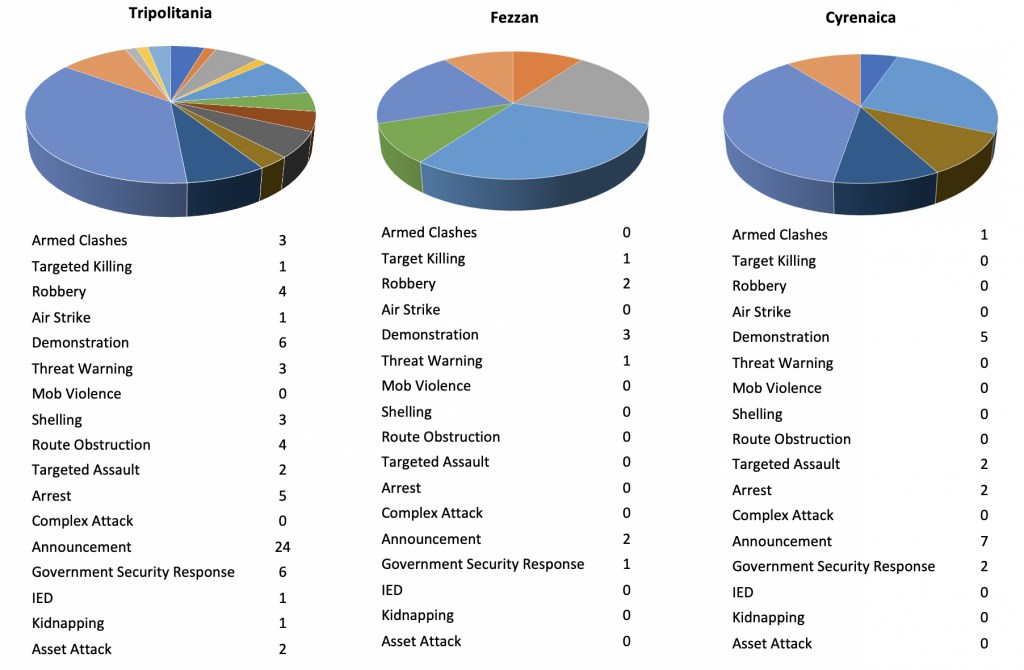
POLITICAL OVERVIEW
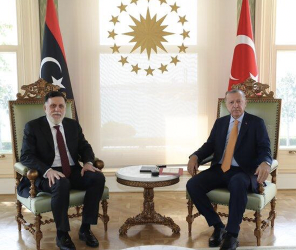
President Recep Tayyip Erdoğan met with the chair of the Presidential Council of Government of National Accord of Libya, Fayez Al Sarraj, on Sept. 6 after a recent ceasefire between the two rival sides of the north African country. The visit came following other senior Libyan officials who had meetings with Turkish authorities over a ceasefire jointly announced by the GNA in Tripoli and the House of Representatives in Tobruk with the condition of creating a demilitarized zone in Sirte and resumption of the oil production. HURRIYET
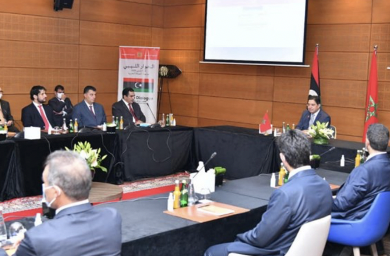
Dubbed “Libyan Dialogue”, the talks brought together five members of the Tripoli-based Government of National Accord (GNA) and five from the Tobruk-based Parliament. Morocco’s approach to the Libyan conflict is based on universal aims to maintain Libya’s territorial integrity, sovereignty, and the cohesion of the Libyan people. The country believes the solution to the crisis can only come from the Libyan people, and that the crisis must be free of foreign intervention. Morocco argues that foreign involvement will further complicate the already complex situation. Morocco also maintains that the solution in Libya must be peaceful and political to ensure the legitimacy of its future government. LIBYA EXPRESS
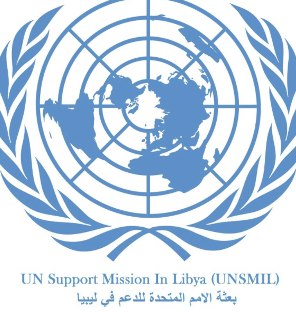
The United Nations Support Mission in Libya (UNSMIL) yesterday congratulated the citizens of Misrata on a peaceful and successful electoral process conducted on 03 September. “This election has, once again, demonstrated the Libyans’ determination to exercise their democratic rights to elect their representatives, defying the many challenges their city and country are facing in these trying times.” Stephanie Williams, Acting Special representative of the Secretary-General (ASRSG) for Libya and Head of UNSMIL, said welcoming the elections. UNSMIL reiterated its strong support for the Libyan people in conducting municipal elections and strengthening local governance, as well as to the CCMCE for its vital role in ensuring municipal elections are conducted democratically and through an inclusive and credible process. LIBYA HERALD
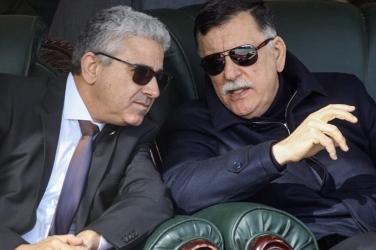
Libya’s internationally recognised Government of National Accord (GNA) on Thursday restored the interior minister to his post after announcing his suspension last week following protests over living conditions, reported Reuters. Fathi Bashagha said in a statement posted online that he had been reinstated after a five-hour hearing about the protests and the role of the security forces. An influential figure from the port city and military power base of Misrata, Bashagha is well regarded by the GNA’s foreign backers and played a central role as it repelled a 14-month assault on Tripoli by eastern-based forces. However, there have been longstanding tensions between armed groups from Tripoli and Misrata, and friction was reported recently between Bashagha and GNA Prime Minister Fayez al-Serraj. MEMO
AIRPORTS & BORDERS STATUS
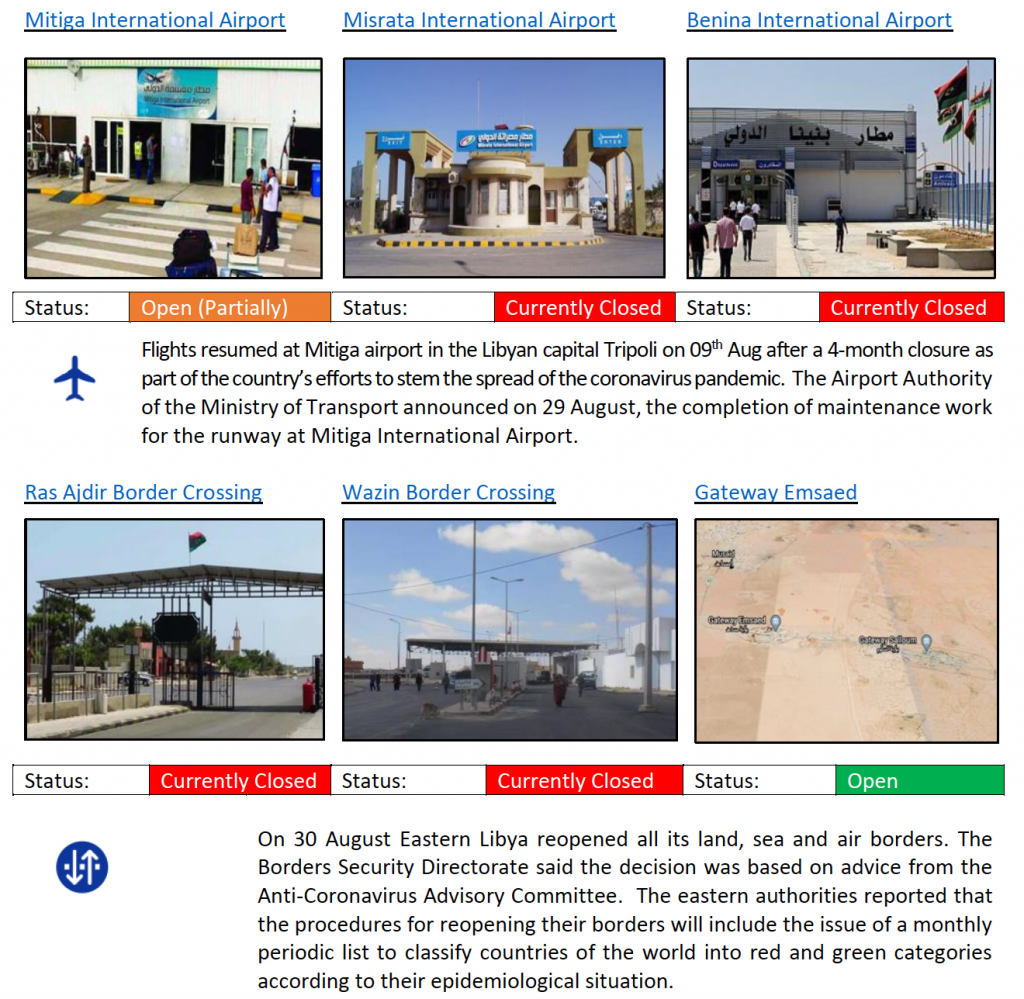
The National Center for Disease Control of Libya on 07 Sep reported 1,085 new COVID-19 cases. The center said in a statement that it received a total of 2,756 suspected samples, of which 655 were tested positive, adding that 18 patients have newly recovered and 11 more died. The total number of COVID-19 cases in Libya so far is 18,834 including 2,099 recoveries and 296 deaths, the center confirmed.
